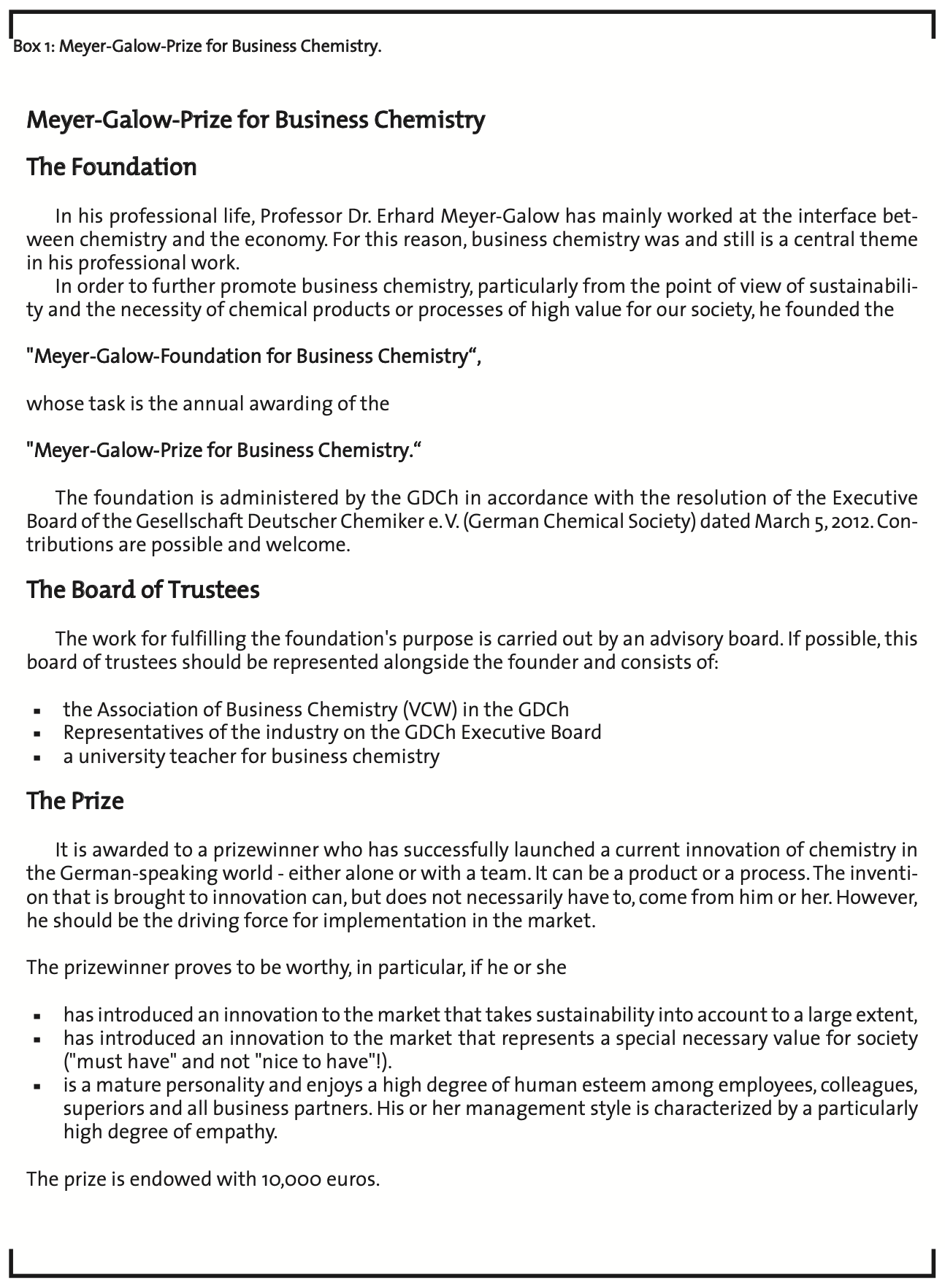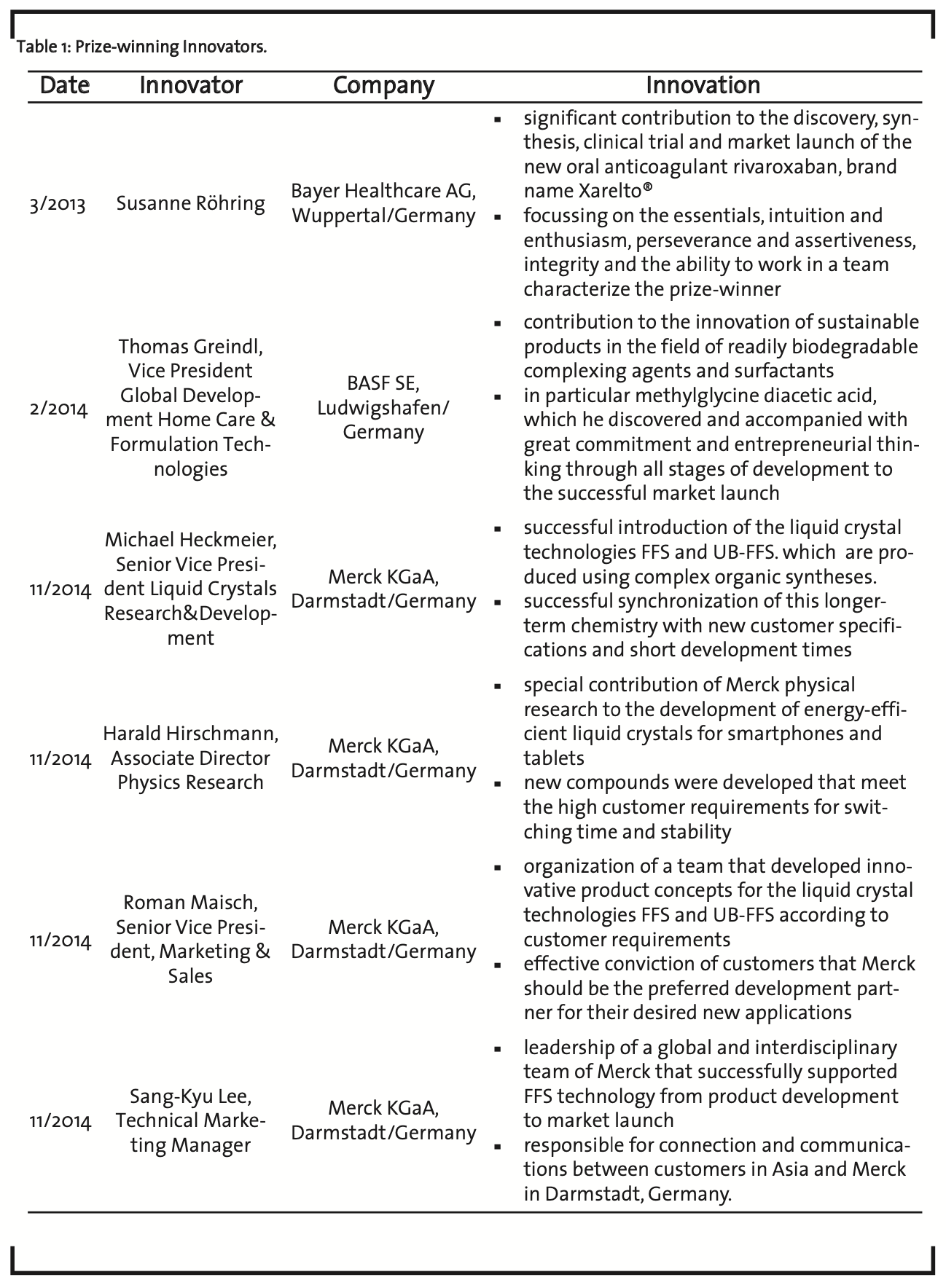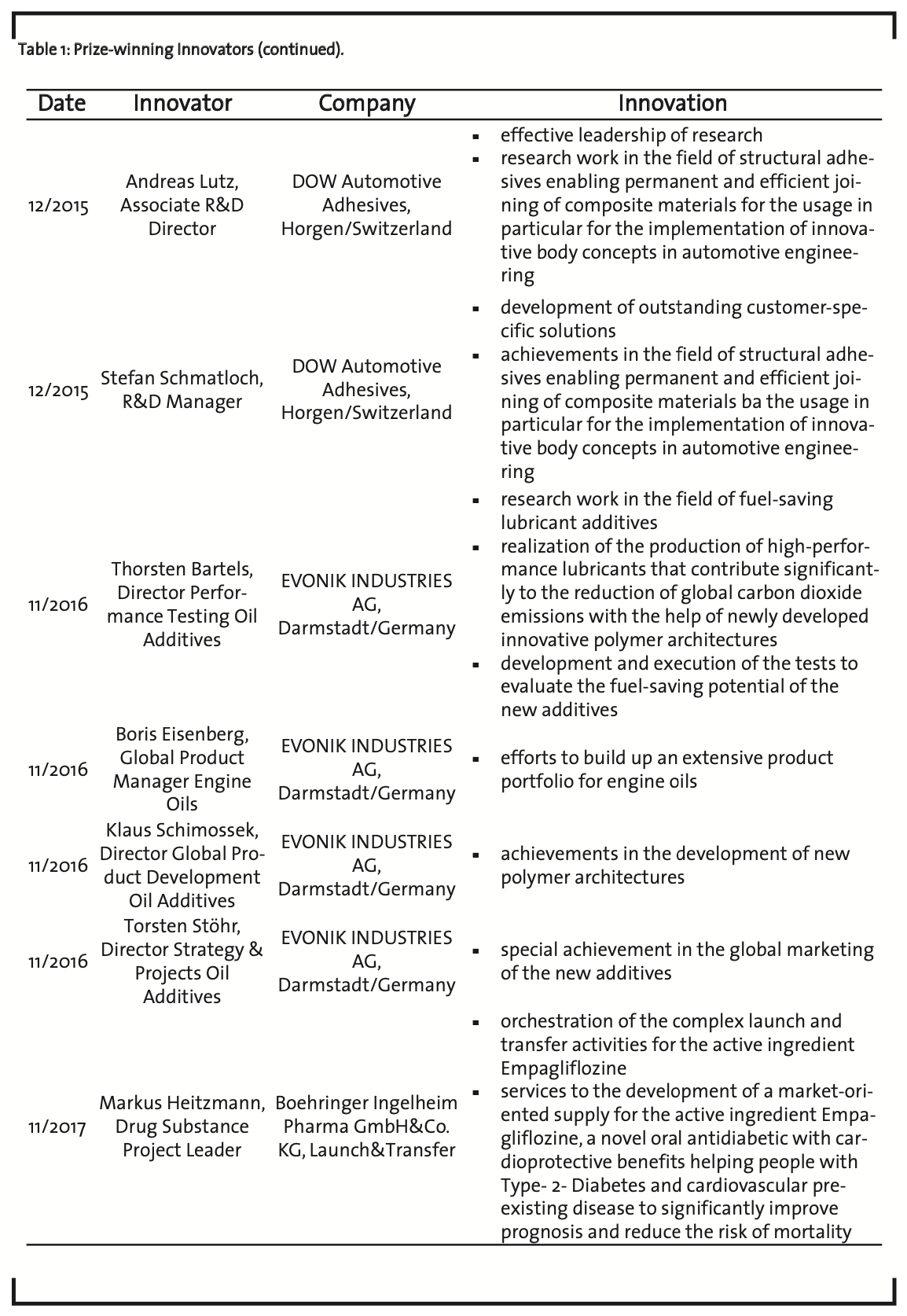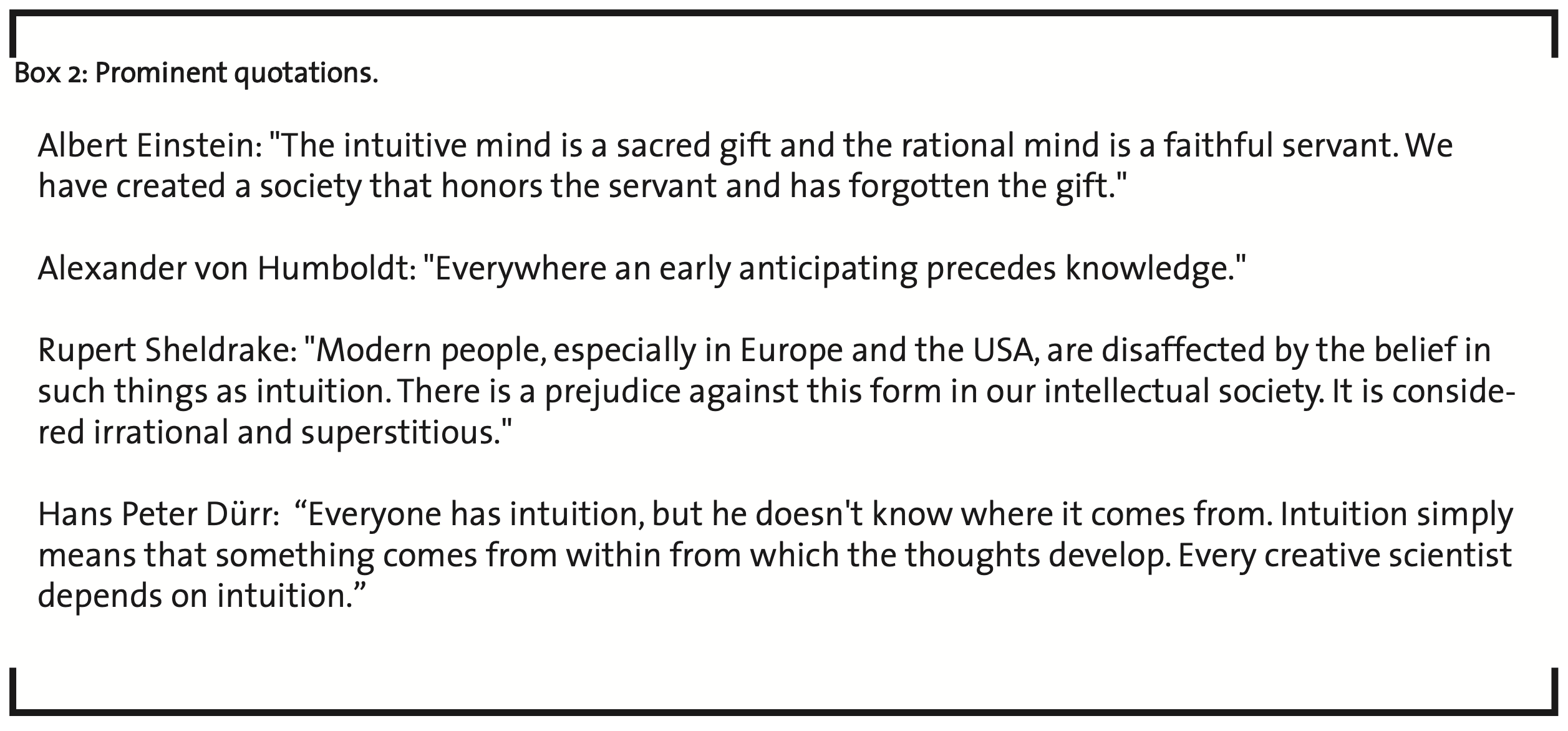Motivation for innovations – experiences and reflections
Abstract
Motivation is a vital part of success in the chemical industry. Besides having the right knowledge and skills at hand to bring innovations on its way, there are plenty of other supporting characteristics like intuition and enthusiasm, persistence and assertiveness, integrity and team spirit as well as great commitment and entrepreneurial thinking. This statement is strengthen in the article by presenting the prize-winning innovators of the Meyer-Galow-Prize and what is needed to become a pioneer in the chemical industry.
1 Introduction
Innovations are vital for companies. They are the energy for preservation and value enhancement. Without innovation, companies approach their end. That is why almost all companies deal with the question: “How can innovation be stimulated?”
According to the second principle of thermodynamics, entropy in closed systems goes against infinity. Now, companies are open systems. They can remain in equilibrium or steady state by internal and external influences, i.e. innovations (Meyer-Galow 2017). Almost all companies try to achieve more innovations by increasing their research expenditures and efforts in the rational space of thinking, because we are conditioned to do so. The successes are often disappointing and limited because our rational thinking, which is limited to knowing, doing, managing, achieving and performing, can only lead to new ideas to a limited extent. Intuitions and inspirations are neglected as sources for new things. Mindfulness, compassion and inner growth is always a prerequisite for drawing from these sources. Intuition comes from “intueri lat.”, which means “to turn inwards”, for example through meditation. For this reason, this article is intended to point out the way to more intuition and inspiration as a path to more innovations1.
1 The author has already given a groundbreaking lecture at the Science Forum of the GDCh (Gesellschaft Deutscher Chemiker-German Chemical Society) in Bremen 2011 on the topic: “Inspirational intuition and creativity in science – we experience more than we know”.
In the years up to 2017, in the industry the conviction has grown that by practicing mindfulness and compassion, spaces for creativity can be created. Pioneers are the companies of the New Economy such as Google et.al.2. An initial spark for this movement was the book Wisdom 2.0 by Soren Gordhamer (Gordhamer 2013). Since then, conferences with this mindfulness theme have become increasingly popular. The author himself participated in the conference “Wisdom 2.0 Europe” 2014 at Google’s headquarters in Dublin/Ireland and in the conference “Living with awareness, wisdom and compassion–The Power of Transformation” in San Francisco/USA in February 2018. Beside the advantage of gaining new impressions, the author furthermore received the confirmation of his own experiences and reflections. Wisdom 2.0 2018 was the premiere gathering focused on exploring the intersection of wisdom and technology with 3000 people, 30 countries and over 50 speakers.
2 New economy definition: the postindustrial world economy based on internet trading and advanced technology.
To support the motivation for more innovations the author founded in 2012 the Meyer-Galow-Foundation for Business Chemistry, which annually awards the Meyer-Galow-Prize for Business Chemistry.
For a summary of the essential see box 1 :
3 Experiences
If you filter out the skills and characteristics of the prize winners3, you will find the following descriptions:
3 In order to make a well-founded decision for the prize, I did not only get to know the prizewinners for a whole day on site, but I also met at least 4 applicants per year in each annual competition or 24 nominees in total since 2013.
Focusing on the essentials, intuition and enthusiasm, persistence and assertiveness, integrity and team spirit, great commitment and entrepreneurial thinking at all stages of development through to successful market introduction, development of outstanding customer-specific solutions, orchestration of complex launch and transfer activities.
The presented research projects took up to 10 years to become successful innovations. Without enthusiasm and perseverance, it is impossible. With great discipline and diligence, the prizewinners did not let themselves be deterred from the course, even if the company did not see the project positively or even decided to end it. They just kept going. Creativity needs a corporate culture free of anxiety, but such a culture does not always exist. Successful innovators, however, cannot be stopped despite a detrimental corporate culture. They are self-confident and fearless. They do not know the fear of failure. They have acquired a high degree of resilience in their lives. The innovators demonstrate high rational thinking ability and the ability to associate knowledge with information.
Some are on a spiritual path or have had deep psychological experiences. Some are religious persons. Others take their dreams as a source very seriously.
Intuition and inspiration also play a role, but the innovators often do not consciously recognize it. Suddenly an intuition inspires them to innovate. It is not often intended to increase the flow of intuition because methods for doing so are often not known. As a consequence, it is possible to have only a few intuitions, but also possible to have more. For this reason, the following chapter describes my own experiences and reflections on how to prepare oneself to receive intuitions through internal growth and thus achieve more innovation.
Three innovators report that ideas come into play especially often in long warm showers; others experience intuition in nature; or in music; or in conversation; or on the beach during vacation ….
4 Reflections
I like to talk about the small and large “innovation funnel”. Most people work with the small funnel, which contains our knowledge, our ability to think, our previous experiences, our emotions, our ability to associate, our intellect. With these tools, we try to come up with new ideas. Few intuitions flow into the small funnel, and only a few of them become inspirations that can lead to inventions, of which only a few lead to innovations. Put simply, the small innovation funnel does not catch enough intuition. You can change that. The funnel is widened when the conditions are created to develop the ability to receive more intuitions and inspirations. With inspiration I mean an inhaled intuition. If we do not inhale the intuition, to make it our own, we easily forget it.
How can this be achieved?
The thinking power of our ego-mind helps us only to a limited extent4. Intuition, however, offers us an inexhaustible additional reservoir and only in the equal development of our logos and our intu- ition as well as in the combination of both sources can we fully exploit our human potential5.
4 Ego-mind is our thinking capacity limited by our ego-consciousness.
5 Logos is the rational principle that governs and develops the universe.
Experience has shown that this is only possible if one creates the preconditions for intuition to flow with a certain lack of intention. That sounds very contradictory to us. But there is no other way. Only if we do not make an effort, do we experience intuition. I am aware that I am now trying to explain a little rationally that it is not rational, but can only be experienced. Well, how can you explain creativity that is not scientific to scientists? If I do this nevertheless, I try to arouse the longing to walk on a path of experience and to practice yourself daily for openness and transparence, without which the intuition cannot be experienced.
Well, I have prominent help (see box 2).
We always try to increase our ability to think, because we are trained in this way. We want to manage innovations better. Innovation management is on everyone’s lips. But managing is always doing. It does not lead to many more ideas. Innovation management may make it easier to implement an invention in the marketplace, although it takes a lot of intuition to do so. But how do you get more inventions? By doing so, we could increase our creativity to an unimaginable extent.
We have often had imaginations and intuitions or inspirations, otherwise our research results would not have been possible. We have never asked ourselves where these ideas come from. Imaginations…..What came to mind from where and when? And why is that? What has been submitted to us when and by whom? Who or what is that which gives us an idea? We have also often had “flashes of inspiration”.
Are those lightning bolts of our egomind? We are subject to a fallacy on the question of where the lightning comes from: from our mind or from the spirit. But neither is wholly true. We sometimes say “gut feeling” in relation to intuition. Intuition obviously comes from the stomach rather than the head. We could create the conditions with a mindful and meditative life that dissolves the one-sided outward orientation of our lives and leads to inner growth.
“Coincidence meets only a prepared mind and spirit,” says Louis Pasteur.
Mind, reason and rational thinking have been the basis of the material world view since Rene Descartes said: “Cogito, ergo sum!” We define ourselves by our thinking. This, however, unconsciously restricts us again.
Gerd Binnig gets to the point:
“Logic alone can’t get you anywhere. Life is far too complex. There’s only one way. You have to follow intuition. It can help us in the complex world because it is so complex itself. We see in today’s world that the overload is obvious. Individuals can’t do it. There should be something like the intuition of an entire society.”
Man never has time today. You could say: “He’s always occupied!” He is flooded with noise. But for intuition you need silence, peace and time. We must move from the “Doing” Level to the “Being” Level. However, we are constantly disturbed in our world by our own diverse activities and by those of our fellow human beings, torn out of silence and calm.
This is tragic and often limits our potential without us noticing it. This is tragic and often limits our potential without us noticing it.
The daily task of meditation is to practice mindfulness, to walk mindfully throughout the day. Mindfulness is the gate through which man has to pass again and again. The practicing person can also practice mindfulness in the hectic pace of everyday life; the untrained person cannot. It is about practicing a mindful life, moment by moment, step by step. Then one becomes ever more present for the moment of the Here and Now (Tolle 2011). This Being in the Here and Now is the prerequisite for opening up to the flow of intuition.
References
Einstein, A., available at http://creatingminds.org/quotes/intuition.htm, accessed 26 January 2018.
Gordhamer, S. (2013): Wisdom 2.0 – The New Movement toward purposeful engagement in business and life, Harper Collins, New York/USA.
Meyer-Galow, E. (2017): Innovationen senken die Entropie eines Unternehmens, available at . https://www.youtube.com/watch?v=inHZ1PYuo3E, accessed 26 January 2018.
Meyer-Galow, E. (2017): Thinking the Unthinkable – Wir erfahren viel mehr als wir denken und wissen – We experience much more than we are able to think and know, available at https://www.youtube.com/watch?v=V2rBEq-e4T0, accessed 26 January 2018.
Pasteur, L., available at http://www.nur-zitate.com/zitate/kategorie/Zufall/seite1, accessed 26 January 2018.
Tolle, Eckhard (2011), The Power of NOW: A Guide to Spiritual Enlightenment.
Von Humboldt, A., available at https:// www.aphorismen.de/zitat/20885, accessed 26 January 2018.



